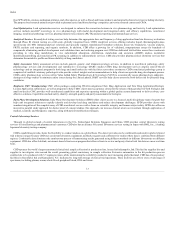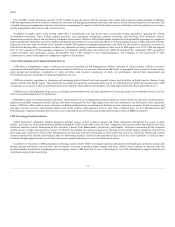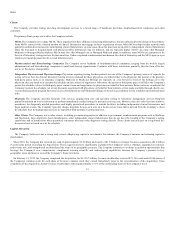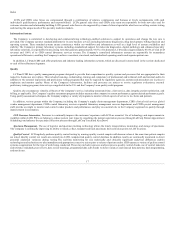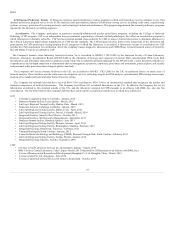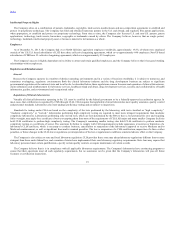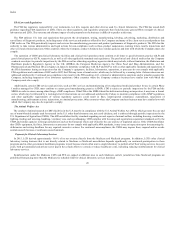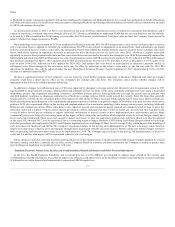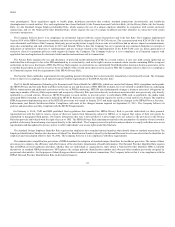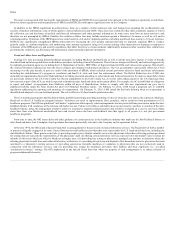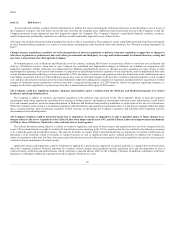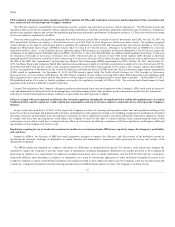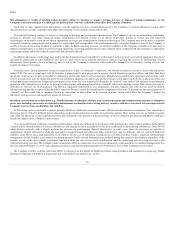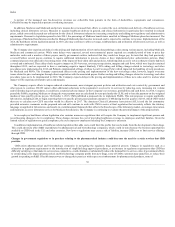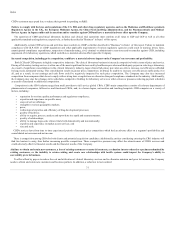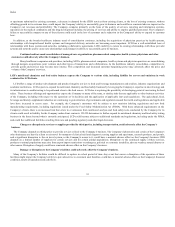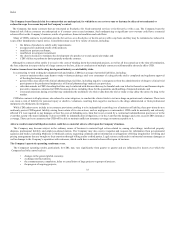LabCorp 2015 Annual Report Download - page 23
Download and view the complete annual report
Please find page 23 of the 2015 LabCorp annual report below. You can navigate through the pages in the report by either clicking on the pages listed below, or by using the keyword search tool below to find specific information within the annual report.
Index
The total cost associated with meeting the requirements of HIPAA and HITECH is not expected to be material to the Company’s operations or cash flows.
However, future regulations and interpretations of HIPAA and HITECH could impose significant costs on the Company.
In addition to the HIPAA regulations described above, there are a number of other national, state and foreign laws regarding the confidentiality and
security of medical information, some of which apply to clinical laboratories and CROs. These laws vary widely but they most commonly regulate or restrict
the collection, use and disclosure of medical and financial information and other personal information. In some cases, state laws are more restrictive and,
therefore, are not preempted by HIPAA. Penalties for violation of these laws may include sanctions against a laboratory's licensure, as well as civil and/or
criminal penalties. Violations of the HIPAA provisions could result in civil and/or criminal penalties, including significant fines and up to 10 years in prison.
HITECH also significantly strengthened HIPAA enforcement by increasing the civil penalty amounts that may be imposed, requiring HHS to conduct
periodic audits to confirm compliance and authorizing state attorneys general to bring civil actions seeking either injunctions or damages in response to
violations of the HIPAA privacy and security regulations that affect the privacy of state residents. Additionally, numerous other countries have similar laws
governing the collection, use, disclosure and transmission of personal and/or patient information.
Existing U.S. laws governing federal healthcare programs, including Medicare and Medicaid, as well as similar state laws, impose a variety of broadly
described fraud and abuse prohibitions on healthcare providers, including clinical laboratories. These laws are interpreted liberally and enforced aggressively
by multiple government agencies, including the U.S. Department of Justice, HHS’ Office of Inspector General (OIG), and various state agencies. Historically,
the clinical laboratory industry has been the focus of major governmental enforcement initiatives. The U.S. government's enforcement efforts have been
increasing over the past decade, in part as a result of the enactment of HIPAA, which included several provisions related to fraud and abuse enforcement,
including the establishment of a program to coordinate and fund U.S., state and local law enforcement efforts. The Deficit Reduction Act of 2005 also
included new requirements directed at Medicaid fraud, including increased spending on enforcement and financial incentives for states to adopt false claims
act provisions similar to the U.S. False Claims Act. Recent amendments to the False Claims Act, as well as other enhancements to the U.S. fraud and abuse
laws enacted as part of the ACA, are widely expected to further increase fraud and abuse enforcement efforts. For example, the ACA established an obligation
to report and refund overpayments from Medicare within 60 days of identification; failure to comply with this new requirement can give rise to
additional liability under the False Claims Act and Civil Monetary Penalties statute. On February 16, 2012, CMS issued a proposed rule to establish
regulations addressing the reporting and returning of overpayments. On February 11, 2016, CMS issued the final rule defining when an overpayment is
identified and adopted a six-year lookback period. The rule is effective 30 days from the publication date.
The U.S. healthcare programs' Anti-Kickback Statute prohibits knowingly providing anything of value in return for, or to induce the referral of, Medicare,
Medicaid or other U.S. healthcare program business. Violations can result in imprisonment, fines, penalties, and/or exclusion from participation in U.S.
healthcare programs. The OIG has published “safe harbor” regulations which specify certain arrangements that are protected from prosecution under the Anti-
Kickback Statute if all conditions of the relevant safe harbor are met. Failure to fit within a safe harbor does not necessarily constitute a violation of the Anti-
Kickback Statute; rather, the arrangement would be subject to scrutiny by regulators and prosecutors and would be evaluated on a case by case basis. Many
states have their own Medicaid anti-kickback laws and several states also have anti-kickback laws that apply to all payers (i.e., not just government
healthcare programs).
From time to time, the OIG issues alerts and other guidance on certain practices in the healthcare industry that implicate the Anti-Kickback Statute or
other fraud and abuse laws. Examples of such guidance documents particularly relevant to the Company and its operations follow.
In October 1994, the OIG issued a Special Fraud Alert on arrangements for the provision of clinical laboratory services. The Fraud Alert set forth a number
of practices allegedly engaged in by some clinical laboratories and healthcare providers that raise issues under the U.S. fraud and abuse laws, including the
Anti-Kickback Statute. These practices include: (i) providing employees to furnish valuable services for physicians (other than collecting patient specimens
for testing) that are typically the responsibility of the physicians’ staff; (ii) offering certain laboratory services at prices below fair market value in return for
referrals of other tests which are billed to Medicare at higher rates; (iii) providing free testing to physicians’ managed care patients in situations where the
referring physicians benefit from such reduced laboratory utilization; (iv) providing free pick-up and disposal of bio-hazardous waste for physicians for items
unrelated to a laboratory’s testing services; (v) providing general-use facsimile machines or computers to physicians that are not exclusively used in
connection with the laboratory services; and (vi) providing free testing for healthcare providers, their families and their employees (i.e., so-called
“professional courtesy” testing). The OIG emphasized in the Special Fraud Alert that when one purpose of such arrangements is to induce referrals of
program-reimbursed laboratory
23


